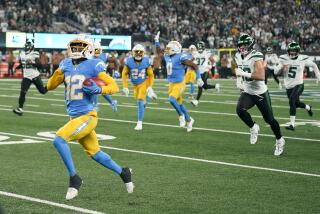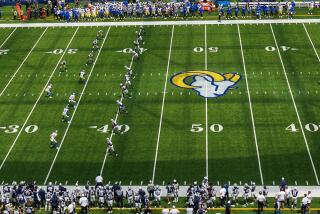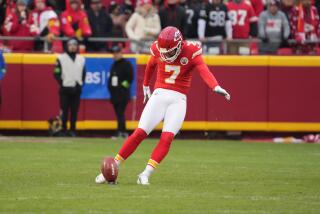New tackling rule could put college football on slippery slope
- Share via
South Carolina defensive end Jadeveon Clowney’s hit on Michigan running back Vincent Smith in the Outback Bowl was the play of the 2012 college football season.
Under new rules this season, a similar tackle might get Clowney ejected.
And if it does, college football ought to just switch to flag football or powder puff.
“The Clowney hit is why they have football,” Washington State Coach Mike Leach said at Friday’s Pac-12 Conference football media day. “That’s why football was invented.”
Every reasonable person wants to do as much as possible to protect players — but not at the expense of what makes football worth watching.
The change in 2013 is an amplification of what is known as the “targeting rule,” which used to draw a 15-yard penalty. This season, in addition to the penalty, the player will be ejected. If he’s ejected in the second half, he will also be required to miss the first half of his next game.
The replay booth can review the play and overturn the ejection but this all seems headed down the slippery slope. “Targeting” is the first personal foul that is reviewable.
Clowney’s hit appeared to be fundamentally perfect. It knocked Smith’s helmet off, but there was no intent to spear or injure.
Yet the officiating coordinator of the Atlantic Coast Conference said recently Clowney would be ejected under the new rule. Steve Shaw, who holds the same position with the Southeastern Conference, said the same play would not be a foul.
And there is your slippery slope.
Eric LeGrand, the former Rutgers player left paralyzed from a hit during a game against Army in 2010, recently wrote on Twitter.com: “There’s no way #clowneyhit is illegal. Take it from a guy who broke his neck.”
During a recent rules seminar, longtime NFL referee Walt Anderson, the Big 12 Conference’s coordinator of officials, ran a slide show explaining the do’s and don’ts of helmet contact: The four areas of emphasis are “Launch, Thrust, Strike and Leading.”
Anderson said most helmet contact is legal, but then spent almost an hour explaining all the times it isn’t.
“You’ve got to lower your strike zone,” Anderson said, in general, about tackling.
You can understand why coaches and players are wary.
The new implementation could hurt teams that play aggressively and on the edge. UCLA, for what it’s worth, was the nation’s most penalized team last year.
“I understand the rule, but as a defensive player it’s going to be difficult to fully adjust my game to all of that rule,” star UCLA linebacker Anthony Barr said.
Barr said he will to continue to play in his usual “full speed and attacking” mode.
“And if I get penalized because of it, then so be it, but I’m going to play the way I play football.”
Here are a couple of other rule tweaks:
• A player who loses his helmet during the course of play must still sit out the next play. However, he can now return without delay if his team uses an available timeout.
• Officials will still run 10 seconds off the clock after injuries in the final minute, but a coach can now stop the clock if he has an available time out.
twitter.com\DufresneLATimes
More to Read
Go beyond the scoreboard
Get the latest on L.A.'s teams in the daily Sports Report newsletter.
You may occasionally receive promotional content from the Los Angeles Times.











